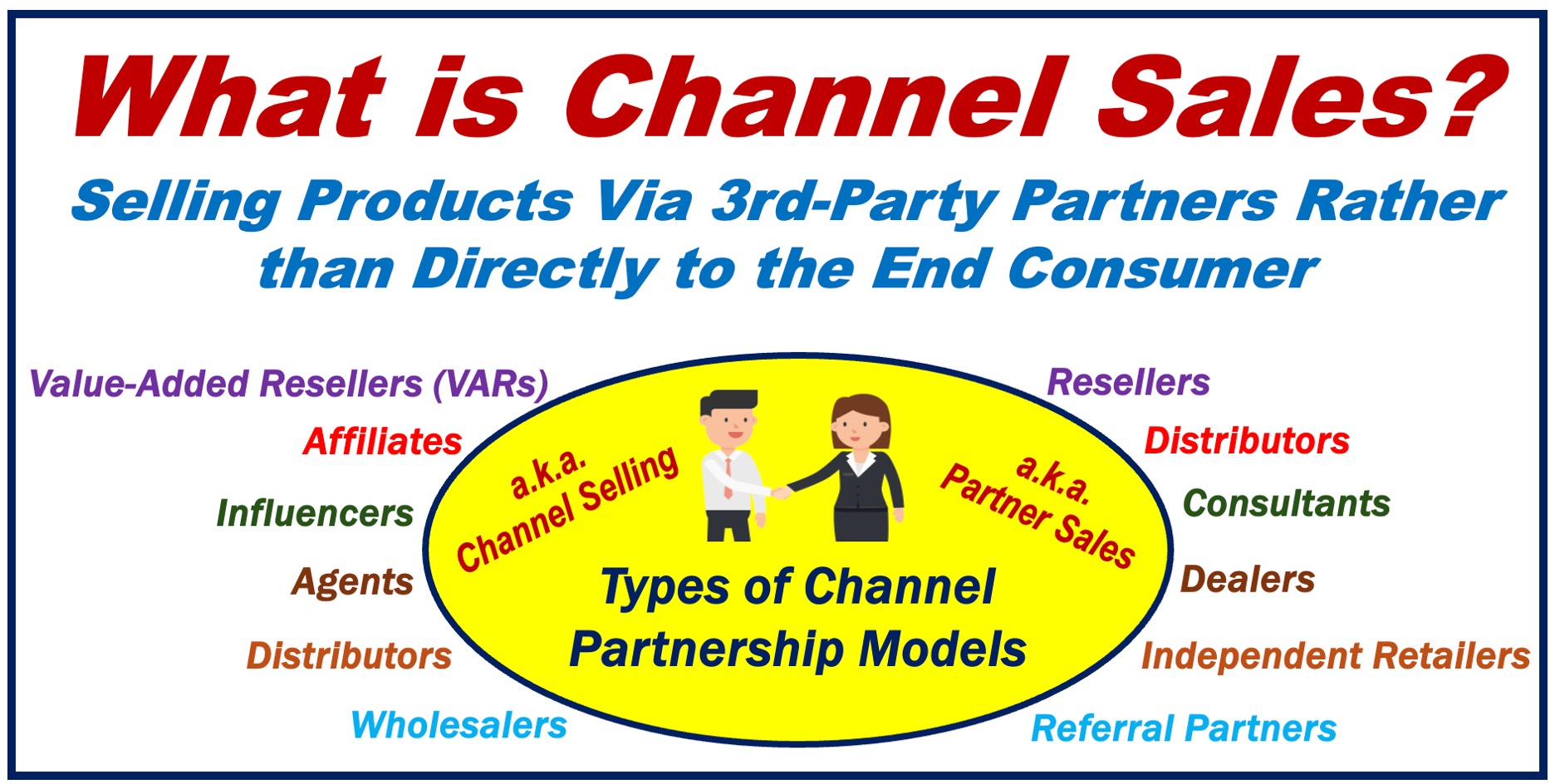If you are selling your products through a third-party company, and not directly to the end user, you are involved in Channel Sales. We refer to the third-party company as a “channel partner.”
For many companies, channel sales allows them to build up a network of channel partners. Through these partners, they can reach a much wider audience.
Pharmaceutical companies are a prime example of a business that leverages channel sales. They do not sell their drugs directly to patients, but to wholesalers, who sell them to distributors, pharmacies, and hospitals.
Video – Channel Sales
Salesforce.com has the following meaning of the term:
“Channel sales is a B2B sales model where a company sells its product through partners. These partners come in all kinds of forms, from alliances to resellers to brokers, and they can step in to prospect, sell, and grow existing customers. Channel sales is also known as indirect sales because the company doesn’t sell directly to the customer.”
Vocabulary and grammar
We can use the terms channel selling, partner sales, indirect sales, and channel sales interchangeably. they all refer to the same concept – selling through third-party intermediaries.
This type of selling contrasts with direct sales, in which the product’s maker sells directly to the end user. Apple, Tesla, and Dyson sell their products directly to consumers, often through their own branded stores or online platforms.
Although the term looks plural – sales – we treat it as a singular compound noun, because it refers to the concept as a singular subject. Therefore, we say/write “What is channel sales?” rather than “What are channel sales?”

Types of channel partners
-
Resellers
These are stores or online retailers that buy your products wholesale and then sell them to customers at a higher price. Walmart in the US and Tesco in the UK are examples of such retailers; they purchase products such as fruit, vegetables, soaps, dog food, desserts, soft drinks, and alcoholic drinks from suppliers and resell them to end users.
-
Distributors
Distributors buy goods in bulk and then sell to smaller resellers – not end ultimate consumers – within a specific region or market.
-
Value-Added Resellers (VARs)
VARs buy your product and customize it or bundle it with other offerings. They tend to provide unique solutions for their customers.
A cybersecurity VAR, for example, might sell various security software solutions but customize the configuration and implementation for each client. They could also offer training and monitoring services.
-
Affiliates
Since the advent of the Internet, affiliate marketing has become increasingly popular worldwide. You are an affiliate if your website promotes the products of another company, such as Amazon, eBay, and ClickBank. These companies are well-known for their affiliate programs, allowing individuals and businesses to earn commissions by referring customers to their products.
Why use channel sales?
-
Reach a Wider Market
Many channel partners have established customer bases; they can get your products in front of people you might not otherwise reach.
-
Expertise
If you sell a complex product, rather than hiring more sales representatives who will require extensive training, it makes sense to team up with experts who specialize in a certain field or market. This is especially the case if you have a small company with a limited budget.
-
Scalability
Scalability is a problem for small businesses. Getting together with partners allows you to sell more without having to hire a large in-house sales team.
-
Reduced Costs
Building a direct sales force can be expensive. Channel partners help cut marketing and distribution costs.
-
Risk Mitigation
If you want to sell in a new territory, partnering with someone who is familiar with the area is much less risky than attempting it on your own.
Sometimes the channel partner bears some of the financial and operational risks, such as holding inventory or managing logistics. This safeguards you from significant losses if the new territory does not perform as expected.
The importance of choosing the right partners
Before committing yourself to a new partner, make sure that they align with your values, goals, and objectives. Not every company or individual is a good fit.
Seek out partners who have a good reputation, a strong track record, and a thorough understanding of your target audience.
A partner who communicates effectively and shares your dedication to achieving common goals can help you enhance your market reach and maintain customer satisfaction.
Partnering with the wrong entity may not only undermine your chances of achieving your goals but also damage your brand. Building a strong brand image takes considerable time and effort, yet it can quickly unravel if you choose the wrong partnership.
Final thoughts
Channel sales is an effective way to extend your reach, boost your revenue, and gain expertise across different markets. It is a great option for small and medium-sized companies with limited resources.
If you can build strong relationships with your channel partners, the alliance is much more likely to succeed.
